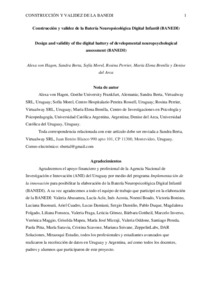Por favor, use este identificador para citar o enlazar este ítem:
https://repositorio.uca.edu.ar/handle/123456789/14683| Título: | Construcción y validez de la Batería Neuropsicológica Digital Infantil (BANEDI) | Autor: | Hagen, Alexa von Berta, Sandra Morel, Sofía Perrier, Rosina Brenlla, María Elena Arca, Denise del |
Palabras clave: | NEUROPSICOLOGIA; NIÑOS; ADOLESCENTES; TRASTORNOS DEL DESARROLLO | Fecha de publicación: | 2020 | Cita: | Hagen, A. von et al. Construcción y validez de la Batería Neuropsicológica Digital Infantil (BANEDI) [en línea]. Documento inédito. 2020. Disponible en: https://repositorio.uca.edu.ar/handle/123456789/14683 | Resumen: | Resumen: Este reporte presenta información sobre el proceso de construcción y evidencia de validez de la Batería Neuropsicológica Digital Infantil (BANEDI) en base a los datos recolectados de una muestra de 988 niños/adolescentes de Montevideo, Uruguay y Buenos Aires, Argentina. Enmarcado en aportes recientes de la neuropsicología cognitiva, BANEDI permite evaluar el desarrollo neuropsicológico de niños y adolescentes de 4 a 15 años y cursando Educación Preescolar Nivel 4 a 3º de Educación Secundaria en la región del Río de la Plata. Apunta a ser un recurso de utilidad clínica y rigor científico para recolectar información sobre los siguientes ocho dominios cognitivos: memoria, atención y funciones ejecutivas, teoría de la mente, habilidades metalingüísticas, lenguaje oral, habilidades viso-espaciales, lenguaje escrito y habilidades matemáticas. Consta de un total de 75 pruebas y dos cuestionarios para padres y docentes.
En este artículo proveemos información sobre los resultados de análisis de parametrización de los ítems de las pruebas, así como evidencia de la validez de contenido, de criterio y evolutiva de la BANEDI. En conclusión, los resultados reflejan que la BANEDI cumple con los criterios de calidad psicométrica necesarios para realizar una estimación válida del funcionamiento neuropsicológico de niños/adolescentes entre 4 y 15 años de edad y cursando Educación Preescolar Nivel 4 a 3º de Educación Secundaria en la región del Río de la Plata. Abstract: This report presents information on the design and validity of the Batería Neuropsicológica Digital Infantil (BANEDI - in English Digital Developmental Neuropsychological Test Battery) based on data collected from a sample of 988 children/adolescents in Montevideo, Uruguay and Buenos Aires, Argentina. Building on recent contributions from cognitive neuropsychology, this instrument aims to assess the neuropsychological development of children and adolescents aged 4 to 15 years and attending Preschool to 3rd year of Secondary school in the region of Río de la Plata. BANEDI intends to be a clinically useful and scientifically rigorous tool to collect information on the following eight cognitive domains: memory, attention and executive functions, theory of mind, metalinguistic skills, oral language, visual-spatial skills, written language and mathematical skills. It consists of a total of 75 subtests and two questionnaires for parents and teachers. In this report we provide information on the results of item parameter analyses of the subtests included in the battery, as well as evidence on the content, criterion and developmental validity of BANEDI. To conclude, results reflect that BANEDI meets the criteria to ensure psychometric quality and can therefore be used to complete a valid estimation of the neuropsychological functioning of children/adolescents aged 4 to 15 years and attending Preschool to 3rd year of Secondary school. |
URI: | https://repositorio.uca.edu.ar/handle/123456789/14683 | Disciplina: | PSICOLOGIA | DOI: | 10.31219/osf.io/v8sx2 | Derechos: | Acceso abierto | Fuente: | Documento inédito. 2020 |
| Aparece en las colecciones: | Artículos |
Ficheros en este ítem:
| Fichero | Descripción | Tamaño | Formato | |
|---|---|---|---|---|
| construccion-validez-bateria.pdf | 388,06 kB | Adobe PDF |  Visualizar/Abrir |
Visualizaciones de página(s)
316
comprobado en 27-abr-2024
Descarga(s)
248
comprobado en 27-abr-2024
Google ScholarTM
Ver en Google Scholar
Altmetric
Altmetric
Este ítem está sujeto a una Licencia Creative Commons

